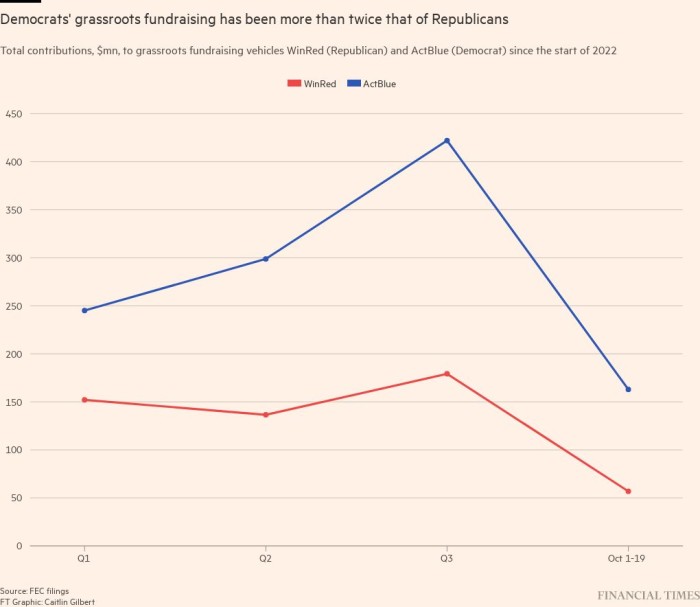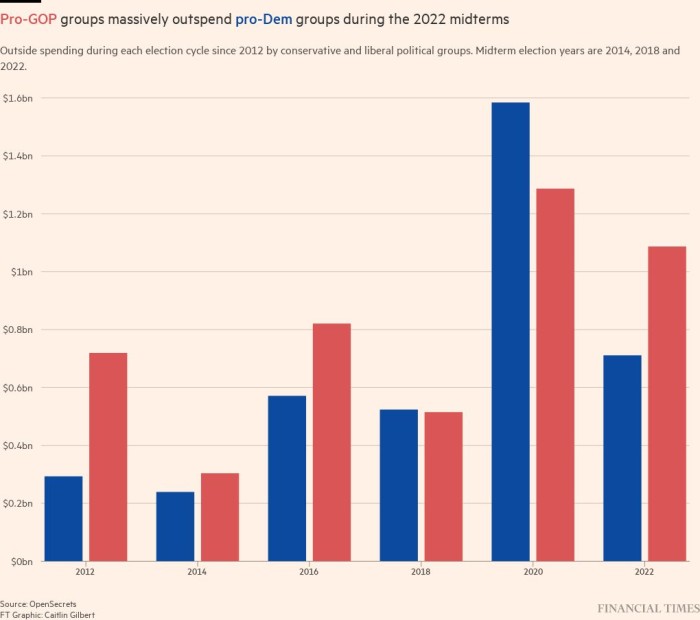[ad_1]
Tens of millions of Americans will flock to the polls on Tuesday to vote in midterm elections that will determine control of Congress and potentially reshape Joe Biden’s presidency after nearly two years in office.
According to the final polling averages, Republicans are expected to win enough seats in the House of Representatives to regain control of the lower chamber of Congress — which they will use to stymie Biden’s agenda and launch investigations into his administration.
But the balance of power in the Senate will depend on the outcome of a handful of races — particularly in Pennsylvania, Nevada and Georgia — that were neck-and-neck heading into the last stretch of the campaign.
As of Monday afternoon, more than 41mn Americans had already cast their ballots by voting early either in person or by mail, pointing to high turnout that could exceed the 122mn people who voted in the 2018 midterm elections.
US political strategists say that in a highly polarised environment, the outcome will depend on which side does a better job of getting its traditional base of voters to show up at the polls in pivotal constituencies.
However, shifts in sentiment among independent and swing voters could also be crucial in the tightest contests, including whether college-educated women in the suburbs will stick with the Democrats, and to what extent Republicans could make gains among Hispanic and black voters.
Four years ago, a backlash against Donald Trump led Democrats to capture a majority in the House, but this year the political winds have been shifting in the opposite direction, amid voter discontent with high inflation, crime and immigration which has favoured Republicans.
Democrats recaptured some ground following the Supreme Court’s overturning of the constitutional right to an abortion, and probes of Trump’s connections to the January 6, 2021 attack on the US Capitol and his mishandling of troves of sensitive national security documents at his Mar-a-Lago residence in Florida.
Yet that rebound stalled over the past month, as Republicans closed ranks behind their candidates, including many of those who embraced and defended Trump, and Democrats struggled to come up with a strong closing message on the economy in the face of the latest discouraging data on consumer prices.
Political spending throughout the 2022 midterms cycle, across both state and federal races, was projected to exceed $16.7bn, according to data released on Thursday by OpenSecrets, as campaigners and their allies scrambled to win over voters.
Democrats have raised more than $1.1bn from grassroots donors this year, more than twice that of Republicans’ grassroots fundraising, according to filings for the parties’ fundraising platforms, WinRed and ActBlue.
However, Republicans have relied heavily on outside spending and mega-donors to propel their candidates in crucial races.
Pro-GOP outside groups, such as super political action committees and hybrid Pacs, have spent nearly $1.1bn on the midterm elections this cycle, about 50 per cent more than pro-Democrat groups have spent.
About half of this sum came from just 10 Republican donors, including $77mn from Richard Uihlein, $67mn from Ken Griffin, $44mn from Jeff Yass and $40mn from Timothy Mellon. Steve Schwarzman, Peter Thiel and Larry Ellison have each given $31mn-$34mn to these groups.
As well as new lawmakers in Congress, Tuesday’s vote will also feature crucial races for state governor, with Democrats Kathy Hochul and Gretchen Whitmer battling to win re-election in New York and Michigan respectively, while Republicans Ron DeSantis and Greg Abbott are seeking new terms in Florida and Texas, respectively.
The governor’s race in Arizona will also be closely watched, with Kari Lake, a Trump-backed former television news anchor, in a close race with Democrat Katie Hobbs. Lake has refused to say whether she would accept the results of her election if she loses, amid concerns that some Republicans could seek to challenge official vote tallies as they did in 2020.
On Monday night, Biden travelled to Maryland for his final rally of the midterm elections to support Wes Moore, the Democrat running for governor, who is widely expected to prevail in his race. Meanwhile, Trump campaigned in Ohio for JD Vance, the former venture capitalist, author and one-time critic of the former president who is running for a Senate seat.
Biden and Trump have signalled that they want to run again for president in 2024, setting up a possible rematch of the 2020 vote — but their decisions could be affected by the results of Tuesday’s election.
Across both parties, there are voices calling privately and even publicly for alternatives to emerge in the race for the White House. They could be emboldened by weak performances by the preferred candidates of both men.
[ad_2]
Source link


